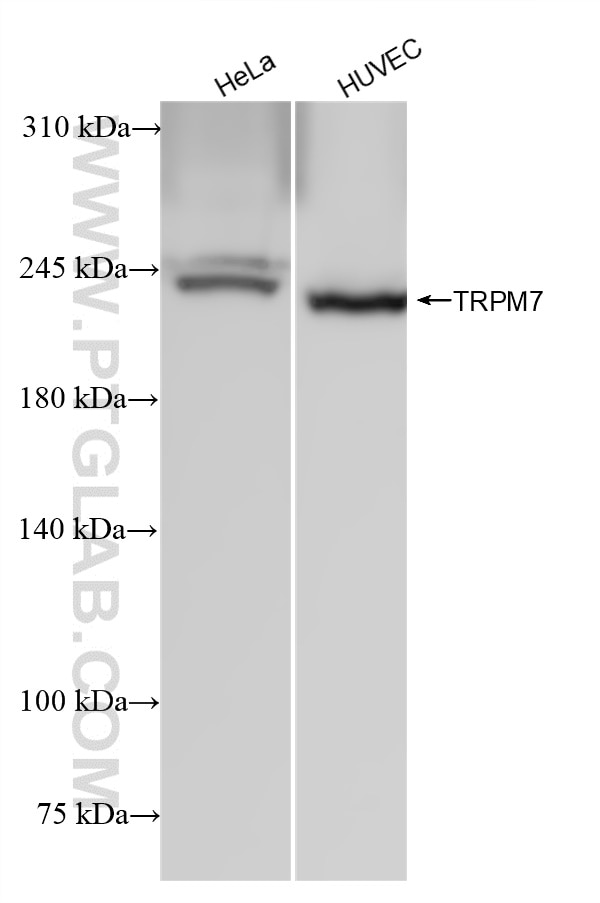Validation Data Gallery
Tested Applications
| Positive WB detected in | HeLa cells, HUVEC cells |
Recommended dilution
| Application | Dilution |
|---|---|
| Western Blot (WB) | WB : 1:1000-1:6000 |
| It is recommended that this reagent should be titrated in each testing system to obtain optimal results. | |
| Sample-dependent, Check data in validation data gallery. | |
Product Information
84324-1-RR targets TRPM7 in WB, ELISA applications and shows reactivity with human samples.
| Tested Reactivity | human |
| Host / Isotype | Rabbit / IgG |
| Class | Recombinant |
| Type | Antibody |
| Immunogen | Peptide 相同性解析による交差性が予測される生物種 |
| Full Name | transient receptor potential cation channel, subfamily M, member 7 |
| Calculated molecular weight | 213 kDa |
| Observed molecular weight | 220 kDa |
| GenBank accession number | NM_017672 |
| Gene Symbol | TRPM7 |
| Gene ID (NCBI) | 54822 |
| RRID | AB_3671866 |
| Conjugate | Unconjugated |
| Form | Liquid |
| Purification Method | Protein A purfication |
| UNIPROT ID | Q96QT4 |
| Storage Buffer | PBS with 0.02% sodium azide and 50% glycerol , pH 7.3 |
| Storage Conditions | Store at -20°C. Stable for one year after shipment. Aliquoting is unnecessary for -20oC storage. |
Background Information
Transient receptor potential melastatin 7 (TRPM7), along with the closely related TRPM6, are unique channels that have dual operations: cation permeability and kinase activity. In contrast to the limited tissue distribution of TRPM6, TRPM7 is widely expressed among tissues and is therefore implicated in a variety of cellular functions physiologically and pathophysiologically. The discovery of TRPM7's unique structure imparting dual ion channel and kinase activities shed light onto novel and peculiar biological functions, such as Mg2+ homeostasis, cellular Ca2+ flickering, and even intranuclear transcriptional regulation by a cleaved kinase domain translocated to nuclei.
Protocols
| Product Specific Protocols | |
|---|---|
| WB protocol for TRPM7 antibody 84324-1-RR | Download protocol |
| Standard Protocols | |
|---|---|
| Click here to view our Standard Protocols |
